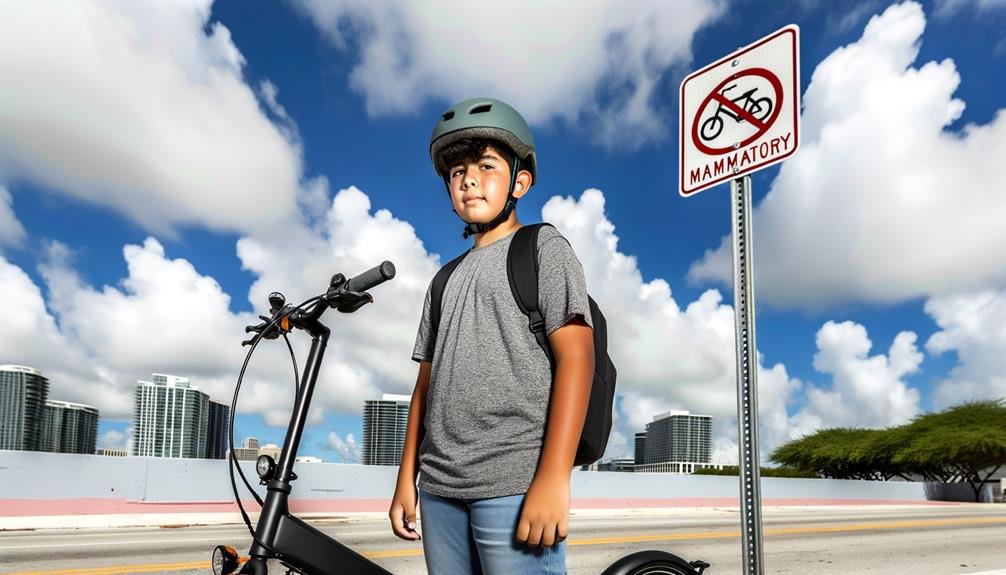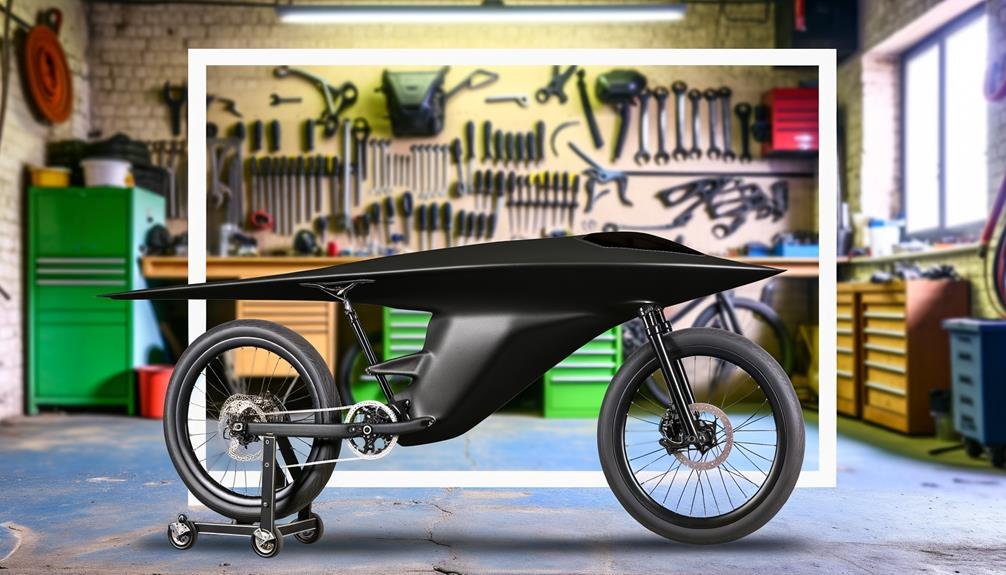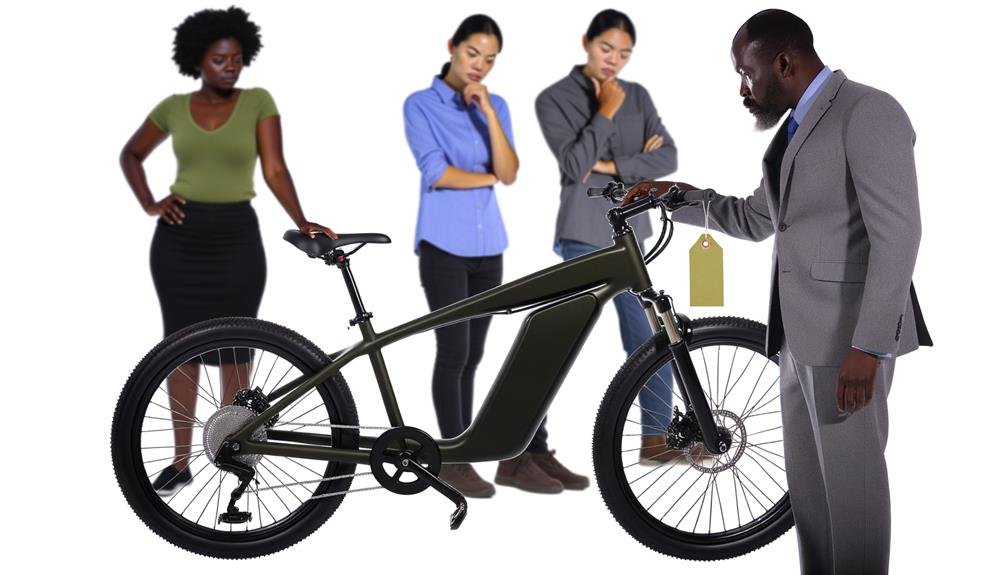Charles Miller is a veteran bike enthusiast with over 12 years of experience dealing with bikes as a mechanic. Despite immense love and expertise for...
Budding bikers, before bounding onto your brand new electric bike, a critical question must be considered: How old do you actually have to be to ride one of these machines?
We've all marvelled at the swift, silent, and sustainable travel they provide. But, without a clear, universally applied age limit, it might be tricky to know when we can legally let our youngsters start riding.
As laws and regulations fluctuate from state to state and country to country, understanding the age requirements becomes a bit of a puzzle.
Let's explore this intriguing issue further, shall we?
Key Takeaways
- Age requirements for riding electric bikes vary from state to state.
- Some states have specific age restrictions, while others do not.
- California requires riders to be at least 16 years old.
- It is important to familiarize oneself with the local laws and regulations regarding electric bike use.
Understanding Electric Bike Laws
How do laws and regulations impact electric bike riding in different states and countries? The answer lies in understanding electric bike laws. These laws vary significantly, affecting age restrictions, licensing, and even the type of equipment required. As we delve into the world of e-bike riders, we see that age plays a critical role.
Certain states categorize e-bikes as motor-driven cycles, imposing age limits and licensing requirements. Others treat them like traditional bicycles, with less stringent age restrictions. Understanding the laws in your state isn't just about compliance, but also about ensuring the safety of riders under the age limit.
The same applies internationally. Age restrictions for riding an electric bike differ vastly across countries. Being informed about these laws not only helps in legal compliance but also in fostering a sense of belonging among e-bike riders.
If you're considering buying an electric bike for a teen, it's essential to familiarize yourself with the minimum age requirement and any other stipulations in your locality. Understanding electric bike laws isn't a mere formality – it's a stepping stone to a harmonious e-biking community.
State-by-State Age Requirements
As we move forward, let's focus on the state-by-state age requirements for riding electric bikes.
It's crucial to understand local e-bike laws, as they not only vary from state to state, but also play an important role in ensuring safety.
Understanding Local E-Bike Laws
Navigating the diverse e-bike laws across the United States can be a bit challenging, given that each state has its own specific regulations, including age restrictions and helmet requirements. We're here to guide you in understanding local e-bike laws that govern how and where to ride your electric bike.
- In Alabama and Alaska, you must be at least 14 years old to operate an e-bike and follow motor-driven cycle laws.
- Arizona allows e-bike use as traditional bicycles, with no specific age or helmet requirements.
- In Arkansas and California, riders must be at least 16 years old while California also requires helmets for Class 3 riders.
Knowing your local laws is crucial for safe and lawful electric bike use. So, stay informed and enjoy your ride!
Age Restrictions in States
Diving into the age restrictions for e-bike use across the U.S., it's clear that laws vary significantly from state to state.
For instance, Alabama and Alaska require you to be at least 14 to ride an electric bike, while states like Arizona and Arkansas have no specific age requirement.
If you're wondering, 'How old do I've to be to ride an electric bike in California?', there's no age restriction, but helmets are mandatory for Class 3 riders.
Texas allows any age to ride eBikes, but those under 15 can't operate a Class 3 e-bike.
The use of e-bikes is becoming increasingly popular, so it's crucial to familiarize ourselves with the laws around riding an electric bike in each state.
Safety Regulations and Age
When it comes to safety regulations and age requirements for electric bike riders, it's crucial to note that these can differ significantly from state to state.
Let's consider:
- Helmet and Age Laws: Some states require helmets and set minimum ages for electric bike use. It's essential for riders to understand and follow these rules.
- Licensing and Registration: States like Alabama and Alaska have specific requirements for electric bikes, including the need for an operator's license and registration.
- Classifications: Certain states have defined classes of electric bikes, like Class 3 electric bikes, that come with different regulations.
Electric Bike Safety Guidelines
As we move forward, let's turn our attention to the crucial topic of 'Electric Bike Safety Guidelines'.
We'll explore the understanding of E-Bike regulations, the significance of safety gear, and practical riding tips.
Our aim is to equip you with the knowledge to safely enjoy the benefits of electric bikes, while respecting laws and etiquette.
Understanding E-Bike Regulations
To ensure safety and legality, we need to familiarize ourselves with the varied regulations governing the use of e-bikes in different states. Local regulations vary, and understanding them is crucial for eBike safety.
- eBike Laws: These vary by state. Some states equate e-bikes with traditional bicycles, while others have specific laws. In some places, you're required to ride Class 1 and Class 2 e-bikes on roads, while in others, e-bikes are prohibited on sidewalks and bike paths.
- Age Restrictions: The minimum age to operate a Class 1 or Class 2 e-bike also varies. Some states allow any person under the age of 14 to ride, while others have higher age limits.
- Equipment Requirements: Helmets are often required, particularly for younger riders. In some states, e-bikes are allowed only if the rider is wearing a helmet.
Safety Gear Essentials
Ensuring one's safety on an electric bike involves more than just understanding the laws. It's equally important to equip oneself with safety gear essentials.
Whether your ride is a low-speed electric or a high-speed electric, wearing a helmet is required. In fact, riders under 14 must wear a helmet, and we'd strongly advise everyone to wear helmets, regardless of age. This is crucial, especially when the rider is pedaling at high speeds.
Additional gear, like knee and elbow pads, can provide extra protection. We also recommend reflective clothing and lights for better visibility. And don't forget, closed-toe shoes with good grip and gloves can make your ride safer and more comfortable.
Always remember, eBike rules are there to protect you.
Riding Etiquette and Tips
Navigating the world of electric bikes requires not only knowledge of safety gear and age requirements, but also a clear understanding of riding etiquette and local regulations. As responsible riders, we need to consider the motor power and if we're equipped with a motor that provides assistance. Let's explore three important riding etiquette and tips:
- Awareness of local restrictions: Always check if you're allowed to ride on bike paths and trails, as regulations differ from place to place.
- Proper use of motor bikes: Remember, bicycles aren't motor bikes. Ride responsibly and don't misuse the motor power.
- Respecting age requirements: Ensure you meet the minimum age requirement in your state before riding an e-bike.
Following these guidelines ensures a safer and more enjoyable ride.
Tips for Young E-Bike Riders
When it comes to young e-bike riders, it's essential to keep in mind some crucial tips for safe and legal riding. E-bikes, which are essentially bicycles equipped with a motor, can be operated by human power alone or with assistance from the motor.
In some states, class 2 electric motor bikes, also known as pedal cycles or motorized bicycles, have specific age restrictions. For instance, the minimum age allowed in certain areas is 14. Therefore, it's vital to understand and follow the laws and regulations in your area where e-bikes are permitted.
As part of the tips for young e-bike riders, safety should always be a priority. Wearing a helmet is a must, and it's required in at least 25 states.
| Before You Ride | While You Ride | After You Ride |
|---|---|---|
| Check local laws | Wear a helmet | Review your ride |
| Understand your e-bike | Follow traffic rules | Check for bike damage |
| Plan your route | Be aware of surroundings | Store bike safely |
Before purchasing an e-bike, consider the rider's needs, the terrain, and local regulations. This ensures a safe and legal riding experience.
Electric Bike Laws Internationally

Let's dive into the realm of international electric bike laws, highlighting how they significantly differ from state to state and country to country, impacting factors such as classification, registration, licensing, and age restrictions. These differences in laws can greatly affect how and where you can use your e-bike, so it's crucial to be informed.
- Classification: Some places, like Alabama and Alaska, classify e-bikes as motor-driven cycles. This means they require an operator's license, registration, and adherence to specific age and helmet rules. Others, like Arizona and California, consider them just as traditional bikes with fewer restrictions.
- Registration & Licensing: In most states, e-bikes don't require registration or a license. However, in countries like China and Japan, the rules are more stringent, and registration may be necessary.
- Where to Ride: Laws also dictate whether e-bikes are allowed on bike paths, sidewalks, or roads. For example, in the UK, Europe, and Canada, rules regarding the use of bike paths can vary greatly.
License and Insurance Needs
Building on our understanding of international e-bike laws, we now turn our attention to the specific license and insurance requirements for e-bike riders. Different states have distinct stipulations, and as such, it's crucial that riders familiarize themselves with the local government's regulations.
In some states like Alabama and Alaska, riders must carry an operator's license and meet the states' registration requirements. However, they aren't required to have insurance for their e-bikes. On the other hand, Texas doesn't require licensing or registration for e-bike usage, but riders under 18 years are mandated to wear helmets.
Before purchasing an e-bike, check your local legislation to ensure you're allowed to operate it. Here's a brief overview to guide you:
| State | Need a License | Carry a License | Insurance Required |
|---|---|---|---|
| Alabama | Yes | Yes | No |
| Alaska | Yes | Yes | No |
| Texas | No | No | No |
Helmet Laws for E-Bikes

Shifting gears, we delve into the varying helmet laws for e-bikes across different states, with some mandating helmet use at all times, while others impose specific age restrictions. Navigating these regulations around helmets can sometimes be complex, but it's essential to make sure we're compliant.
- In states like Arkansas and California, class 3 e-bikes must follow the same rules as traditional bikes. Riders are required to wear helmets and there are age restrictions for using these bikes.
- Texas, on the other hand, has specific age restrictions for riding Class 3 e-bikes and mandates riders under 18 to wear a helmet.
- However, in New Mexico, there are no explicit helmet laws for e-bikes, though it's always wise to wear one for safety.
Keep in mind, these are just examples, and laws may vary in your area. It's vital to understand the specific helmet laws and age restrictions for e-bike riders in your state to ensure legal and safe riding. Acknowledge that these laws are in place for our protection, and adhering to them helps us feel a part of a responsible and safety-conscious community.
Buying an E-Bike for a Teenager
Venturing into the realm of buying an e-bike for a teenager, it's essential to weigh the age requirements and regulations for e-bike riding in your state. Local legislation is a must to check before purchasing an e-bike for a teen, to ensure legal and safe riding. A teen must meet the minimum age of 113 in those states that impose restrictions.
Here's a snapshot of some considerations:
| Consideration | Recommendation |
|---|---|
| Age Requirements | Check state and local laws |
| Helmet Requirements | Safety is paramount, always enforce helmet use |
| E-bike Class | Class 2 and Class 3 bikes may have age and speed restrictions |
In choosing an e-bike, consider your teen's needs, interests, and the terrain in your area. Some states have helmet requirements, so be sure to research these regulations. Safety guidelines must be followed to prevent accidents and promote responsible riding habits. Teens are typically allowed on the bike path unless specifically prohibited. And remember, Class 2 and Class 3 e-bikes are not always permitted on bike paths. Make sure to verify local laws before hitting the road.
Frequently Asked Questions
Can a 13 Year Old Ride an Electric Bike?
We'd say it's possible for a 13 year old to ride an e-bike, considering safety measures, parental supervision, and local age restrictions. However, understanding bike specifications, riding locations, and maintenance knowledge are also crucial.
How Old Should You Be to Have an E-Bike?
We believe age restrictions for e-bikes vary. Safety, legal implications, adult supervision, and responsible use are vital. Despite health benefits, maintenance and riding rules must be considered. Always prioritize safety when enjoying e-bikes.
Do You Need a License to Ride an E-Bike in Texas?
In Texas, we don't need a license to ride an e-bike. Texas regulations are lax, no registration or insurance necessities exist. However, safety considerations are key, especially considering age restrictions and helmet requirements.
Do You Need a License for an Electric Bike in Ohio?
We're examining Ohio regulations for e-bike usage. License requirements, safety measures, and legal consequences are all important aspects. Ohio's e-bike rules consider factors like licensing process, age, and road legality. Let's delve deeper.
Conclusion
In navigating the e-bike world, it's crucial to know your local laws, understand safety guidelines, and always prioritize helmet use.
Whether you're young or old, a seasoned cyclist or a beginner, we must all take steps to ensure a safe and enjoyable ride.
From state to state, country to country, the rules may change but our commitment to safety and respect for the road must remain unwavering.
Remember, an informed rider is a responsible rider.

Charles Miller is a veteran bike enthusiast with over 12 years of experience dealing with bikes as a mechanic. Despite immense love and expertise for his Tacoma, he rides his Trek Ebike more. Anytime you meet him, you’ll either hear him talking about Bikes, or writing about all things bikes and cars on this blog.
More Posts


